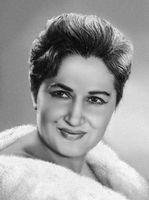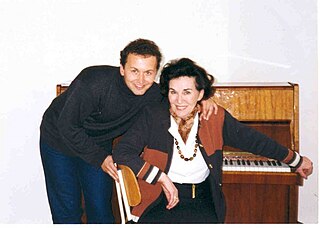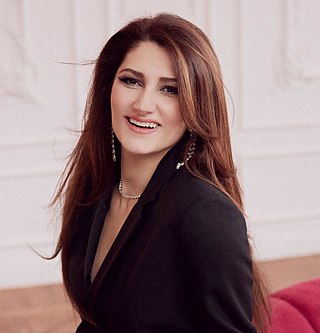
The Mariinsky Theatre is a historic theatre of opera and ballet in Saint Petersburg, Russia. Opened in 1860, it became the preeminent music theatre of late 19th-century Russia, where many of the stage masterpieces of Tchaikovsky, Mussorgsky, and Rimsky-Korsakov received their premieres. Through most of the Soviet era, it was known as the Kirov Theatre. Today, the Mariinsky Theatre is home to the Mariinsky Ballet, Mariinsky Opera and Mariinsky Orchestra. Since Yuri Temirkanov's retirement in 1988, the conductor Valery Gergiev has served as the theatre's general director.

The Snow Maiden is an opera in four acts with a prologue by Nikolai Rimsky-Korsakov, composed during 1880–1881. The Russian libretto, by the composer, is based on the like-named play by Alexander Ostrovsky.

The Tsar's Bride is an opera in four acts by Nikolai Rimsky-Korsakov, the composer's tenth opera. The libretto, by Ilia Tyumenev, is based on the drama of the same name by Lev Mey. Mey's play was first suggested to the composer as an opera subject in 1868 by Mily Balakirev. However, the opera was not composed until thirty years later, in 1898. The first performance of the opera took place in 1899 at the Moscow theater of the Private Opera of Savva Mamontov.

Sergei Yakovlevich Lemeshev was a Soviet and Russian opera singer and director. People's Artist of the USSR (1950).

Mark Osipovich Reizen, also Reisen or Reyzen, PAU, was a leading Soviet opera basso singer.

Irina Konstantinovna Arkhipova was a Soviet and Russian mezzo-soprano, and later contralto, opera singer. She sang leading roles first in Russia at the Sverdlovsk Opera and the Bolshoi Theatre, and then throughout Europe and in the United States. People's Artist of the USSR (1966) and Hero of Socialist Labour (1984).

The Private Opera, also known as:
Vassili Vassilyevich Nebolsin was a Russian conductor. He studied at the college of the Moscow Philharmonic and became conductor of the orchestra in 1918. He became choir master of the Bolshoi in 1920 and its conductor in 1922. He taught at the Moscow Conservatory from 1940 to 1945. The Stalin Prize was awarded him in 1950.

Radmila Bakočević, is a Serbian operatic soprano who had a major international opera career that began in 1955 and ended upon her retirement from the stage in 2004. During her career, she sang at most of the world's important opera houses, including performances throughout Europe, North and South America. She forged important long-term artistic partnerships with two opera houses during her career: the National Theatre in Belgrade and the Vienna State Opera.

Irina Petrovna Bogacheva was a Russian mezzo-soprano at the Mariinsky Theatre and a professor of voice at the Saint Petersburg Conservatory. Trained in Leningrad and at La Scala in Milan, she performed leading roles of the Russian and Italian repertoire at major international opera houses. Dmitry Shostakovich composed a song cycle to poems of Marina Tsvetaeva for her.

Yevgeny Yevgenievich Nesterenko was a Soviet and Russian operatic bass. He made an international career, based at the Bolshoi Theatre. He performed a vast repertoire of 50 leading roles, and was known for the title role of Mussorgsky's Boris Godunov. He was active in concert, and composers wrote music for him such as Suite on Verses of Michelangelo by Dmitri Shostakovich. He was a teacher at Moscow Conservatory and the Music and Arts University of the City of Vienna.
Irina Zhurina is a Russian operatic coloratura soprano.
Sviatoslav Nikolayevich Knushevitsky was a Soviet-Russian classical cellist. He was particularly noted for his partnership with the violinist David Oistrakh and the pianist Lev Oborin in a renowned piano trio from 1940 until his death. After Mstislav Rostropovich and Daniil Shafran, he is spoken of as one of the pre-eminent Russian cellists of the 20th century.

Dmitri Tcherniakov is a Russian theatre director, and winner of numerous national Golden Mask theatre awards, who works with many European opera houses.

Dinara Alieva is an Azerbaijani and Russian opera singer (soprano). She is currently a soloist at the State Academic Bolshoi Theatre of Russia, where she made her debut in 2009 as Liù in Puccini's opera Turandot. People's Artist of Azerbaijan (2018).

Sergei Petrovich Yudin was a leading Russian operatic tenor with a lyric voice. Honored Artist of the Russian Federation in 1933.

Larisa Ivanovna Avdeyeva or Avdeeva was a Soviet and Russian mezzo-soprano, who starred with the Bolshoi Opera for thirty years. People’s Artist of the RSFSR (1964).

Concordia Antarova was a Russian contralto who starred in the Bolshoi Theater for more than twenty years. After her singing career ended, she wrote theosophical texts. She was recognized as an Honored Artist of the RSFSR in 1933.

Dmitry Stanislavovich Belosselskiy is a Ukrainian operatic bass singer who made an international career.

Evgenija Ivanovna Zbrueva, in Russian Евге́ния Ива́новна Збру́ева, was a Russian contralto opera singer.















